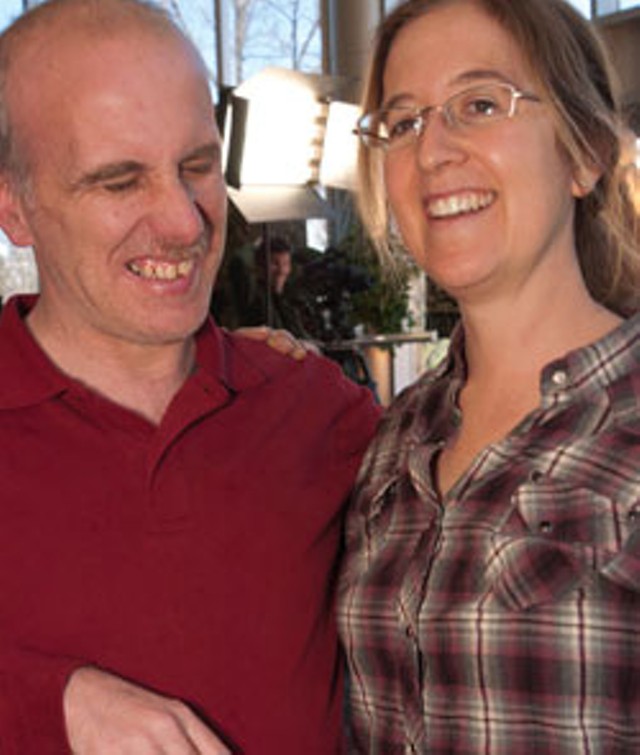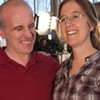Published April 11, 2012 at 8:12 a.m. | Updated September 11, 2020 at 11:35 a.m.
Mark Utter sits at a computer keyboard with a broad, toothy grin, his eyes closed and head cocked slightly, as though he were listening to a muse whispering in his ear. After a long pause, he opens his eyes and, with slow, deliberate movements, pecks at the keys with a single, outstretched finger.
“I am really,” he types, misspelling and deleting the word “really” several times before getting it right, “happy to meet you.” His greeting is addressed to me, a visiting reporter.
It takes Utter nearly five minutes to type those seven words. Still, he presses on undeterred. His smile never fades, and occasionally he even chuckles or squeaks gleefully, despite his obvious difficulty in getting his hand to obey his will.
Utter can speak a few words but communicates much more effectively, and eloquently, using this alternative method known as facilitated communication — FC for short. Utter’s facilitator, Emily Anderson, sits patiently by his side, gently touching his elbow and occasionally offering him verbal encouragement.
Anderson is director of creative performance and cultural access at VSA Vermont, a nonprofit arts and educational organization for Vermonters with disabilities. For the last seven years, she’s been meeting with Utter about once a week for several hours of FC dialogue at her office in Winooski’s Woolen Mill.
Formally trained in FC, Anderson explains that she’s not directing Utter’s arm movements but simply “grounding” him.
What does it do for him when Anderson touches his elbow?
“It focuses my energy,” he types, slowly and rhythmically.
Mentally or physically?
“Both.”
For the next 90 minutes, we engage in more typed, slow-motion conversation (see sidebar). Though Utter hears and understands every word others say, Anderson still types her side of the conversation. She does this in part to maintain a record of their discussions.
Anderson’s typing serves another function: It puts her and Utter on equal footing. And equality is a rare commodity in a world that often doesn’t acknowledge the intelligence, or worth, of individuals who cannot communicate by the usual means.
In clinical terms, Utter, 47, would probably be diagnosed today as autistic, though neither Anderson nor Sheryl Vuley, Utter’s sister and legal coguardian, can say for sure what his original diagnosis as a child was. Many children born in the 1960s with similar neurological conditions were labeled mentally retarded. But anyone who reads Utter’s words today can recognize his keen intelligence and creativity, which for years remained hidden.
Indeed, Utter and Anderson’s recent weekly FC session isn’t just idle chitchat. They’re discussing details of a 25-minute film that Utter wrote called “I Am in Here: A View of My Daily Life With Good Suggestions for Improvement From My Intelligent Mind.”
The screenplay, which took Utter more than five years to compose, explores what it’s like to be him on a typical day. Utter didn’t just write the script. He’s also doing much of its animation and will play himself — or one aspect of himself — when filming starts this summer. Assuming, that is, he and Anderson can pull together the $50,000 needed to bring Utter’s vision to the screen.
Raising such a large sum is daunting, but Utter’s project has garnered the interest and support of a variety of people in Vermont’s creative and business communities. Thus far, he’s received technical or financial help or both from, among others, actors Rusty DeWees and Paul Schnabel, documentary filmmaker Bess O’Brien of Kingdom County Productions, designer and builder Russ Bennett of NorthLand Design & Construction, and filmmaker and educator Mary Arbuckle of Burlington College’s film department.
Lisa Schamberg, a retired Burlington High School teacher, and her husband, Pat Robins, who chairs the board of SymQuest, also agreed to make a significant financial contribution to “get the ball rolling.”
As Schamberg explains, “For somebody who’s not able to communicate in the traditional ways we’re used to, to be able to communicate that ... there is somebody in there — and a thoughtful and articulate person — it just felt important enough to us that we wanted to support it.”
Why are so many people rallying to support Utter’s project?
“He’s a very charming man,” says Joyce Watts, Utter’s full-time assistant from the HowardCenter. She has worked with him for 13 years. “I just think so many people have been touched by him,” Watts continues. “He’s so optimistic and enthusiastic. I’ve never seen him not enthusiastic.”
Asked if she can describe Utter’s mental capability, which remained largely unknown until he started doing FC about 15 years ago, Watts says, “I have no way to measure that. I just know that, in some ways, he’s probably smarter than I am.”
On a recent weekday morning, Watts and I are seated in the lobby of the Palace 9 Cinemas in South Burlington, watching director Jim Heltz prepare to shoot a scene for the upcoming trailer for “I Am in Here.” Heltz, an award-winning filmmaker and co-owner of Green Mountain Video in Williston, has agreed to work on this project as his seventh collaboration with VSA Vermont’s Awareness Theater Company. The trailer will be used in part to help raise funds for the film itself.
In this scene, Utter and his friend, played by 24-year-old Nicole Villemaire, approach the theater cashier to buy tickets for a movie. As Villemaire struggles to pronounce the film’s title, a group of teenagers behind them start snickering.
“No retards can see that movie. It’s, like, R rated!” whines a pretty but nasty “Bossy Kid,” played by 16-year-old Kayleigh Saunders of South Burlington. The other teenagers laugh and point.
“Cut!” yells Heltz, then emerges from behind the camera and approaches the actors. “That was good, but Mark, you’re looking into the camera. And when Kayleigh starts talking, you need to turn around and look at her. Understand?”
Utter smiles and nods vigorously, his silent movements reminiscent of Harpo Marx.
Heltz tries a second take, but this time Villemaire flubs her line. On the third take, and five or six subsequent ones, Utter either forgets to turn around on cue or hops absurdly, like a bunny.
“Cut!” the director yells again, doing his best to conceal his evident frustration. “Mark? I know you wrote the script, but you can’t act.”
All the actors laugh, including Utter, who seems unfazed by the plodding rate of progress.
Finally, after more than 15 takes, many of them riddled with actor errors or technical snafus, Heltz seems confident that he got enough good ones to move on. He yells, “Cut! Print!”
Afterward, I ask Saunders, who’s as sweet in real life as she is insensitive in Utter’s screenplay, why she volunteered for this movie.
“It’s really moving, and it’s a different story than you normally hear,” she says. Usually, Saunders says, the “mean kids” realize by the end of the story that they’re mean and make amends. “This is much more realistic.”
The cast and crew set up the next shot, in which Saunders’ character is confronted by “Exact Mark,” or Utter’s inner voice, played by Schnabel. As Utter describes Exact Mark in a voice-over, “He represents my mind, which does not get out much.”
Why did Schnabel agree to play Mark in the trailer?
“There’s so much merit there. It’s so artistic,” Schnabel says of the screenplay. “And it’s this incredible opportunity for people to be let into this world that they know nothing about — or at least I knew nothing about.”
Utter’s project is reminiscent of another film about Vermonters with autism: the 2011 documentary Wretches & Jabberers, by Oscar-nominated director Gerardine Wurzburg. In the title, “wretches” refers to people with limited speech, while “jabberers” refers to those who can speak freely. The movie follows Larry Bissonnette of Milton and Tracy Thresher of Barre as they visit Sri Lanka, Japan and Finland. Along the way, they meet other individuals on the autism spectrum who communicate via FC.
The film, which is alternately uplifting and heartbreaking, explores a common theme among autistics: how they lived for decades in silent desperation and loneliness until FC freed them from what one calls autism’s “death grip on our actions.”
Wretches includes a scene where Thresher meets with then-state-senator Phil Scott about proposed budget cuts to programs for Vermonters with disabilities. After Thresher hits an emotional wall, as he struggles physically and mentally to engage with Scott, he says, via FC, “Yes, this is a great conversation, so try to ignore the man behind the curtain.”
Wretches & Jabberers had a profound impact on Utter, whose own life has many parallels to those of the men in the film. Like Bissonnette, Utter learned FC from Pascal Cheng, the education and communication specialist at the HowardCenter who travels with Bissonnette and Thresher in the film. Before Anderson began working with Utter seven years ago, she worked with Bissonnette using FC.
Controversy has shrouded this revolutionary mode of communication for years. On October 19, 1993, the PBS investigative series “Frontline” aired a story called “Prisoners of Silence,” which raised doubts about FC’s validity. Among other concerns, the exposé highlighted allegations of sexual abuse made by autistic people against their caregivers, most of which were later disproved.
Today, Cheng doesn’t dismiss the controversy surrounding FC, but he downplays its importance. A number of people who use this method of communication, he explains, were previously labeled as having significant mental disabilities and presumed to have no capacity whatsoever for sophisticated language, literacy or thought. As a result, skeptics often charged that the facilitator was directing the autistic’s arm movements, albeit subconsciously.
“The question was, who was doing the communicating?” Cheng explains. “In our society, if you’re someone who doesn’t talk, there are a lot of assumptions about your intellectual capability.” Or lack thereof.
People with communication disabilities, such as Utter, want the same things as everyone else, Cheng continues, even when the obstacles to achieving them are weighty.
“The kind of life they want is no different than you or I [want]. The path they might take might be a little different,” he says. “As Larry Bissonnette says, ‘I’m more like you than not.’”
For Utter, a seminal moment of his life came in October 2010, when he and Anderson attended an international conference at the Hilton Hotel in Burlington that focused on expanding the potential of people with communicative disabilities. The Making Communication Happen Worldwide conference kicked off with a premiere of Wretches & Jabberers. Following that were several panel discussions, during which attendees from around the world communicated via FC. Large screens displayed their comments as they “spoke” to one another and the audience.
As Anderson recalls, the experience seemed to change Utter, who was on one of the panels.
“That just put so much wind into [Mark’s] sails,” Anderson remembers. “He used to look up to Larry and put him on a pedestal as so eloquent and so much bigger than him. And now he felt like a colleague.”
Mark Utter lives in a small ranch-style house in Colchester with his mother, sister, brother-in-law, two neices, and a cat and dog. On a recent sunny afternoon, Sheryl Vuley, who’s 11 months younger than her brother, sits at the kitchen table while he stays quietly on the living-room couch watching television.
Vuley, who has helped care for Utter since she was a child, talks adoringly about her older brother and his weekly activities: Special Olympics, bowling, basketball practice, horseback riding, swimming. “Swimming!” Utter chimes in from the other room at the mention of the last pastime.
Utter received special education at Champlain Elementary School and, later, at Essex High School, from which he graduated in 1986 at age 21. Though Vuley and her mom taught Utter to read, it’s a bit of a mystery how he completed his education, as it would be another decade before anyone could communicate with him effectively using FC.
Utter now works two days a week in the kitchen at Champlain College as a dishwasher. Vuley proudly shows off a certificate of appreciation he received recently from Sodexo for not missing a single day of work in 15 years.
Vuley and her mother are the only two members of the family who use FC with Utter, though they don’t do so regularly. How did Vuley communicate with her brother when they were kids?
“Sometimes it was hard to understand him because of his speech and everything,” Vuley says, “but as we grew up, it was much easier to understand Mark.”
According to Anderson, Utter acquired what little spoken language he has from his sister, who often read books aloud to him. His mother watched a lot of TV and classic movies, which Utter soaked up. In fact, Anderson remembers an occasion when Utter was composing a scene from an earlier version of his screenplay. Anderson immediately recognized the speech and called him out for plagiarizing another writer. It was Shakespeare.
Vuley expresses unqualified love for her brother and seems to dote on him — lately, she’s put in countless hours organizing a Calcutta-style fundraiser for his movie. Her protectiveness is strongly evident, too.
For example, Vuley points out that Utter can shower, shave, eat breakfast and make himself lunch. However, the family never lets him use the stove or walk the streets of Colchester by himself. As she puts it, “He’s never been exposed to stuff like that.
“You can ask him a question, and he’ll answer it,” Vuley adds. “Sometimes I wonder if he really understands it.”
If Utter is bitter that people underestimate his potential, including some who’ve known him for years, he doesn’t let it show.
“I have always lived with my mother who has been treating me like a little boy all these years,” he writes. “I love her dearly.”
Last month, the Centers for Disease Control and Prevention reported that the number of children diagnosed with autism rose 78 percent in the last decade, with one in every 88 kids now believed to fall somewhere on the autism spectrum. While the underlying causes are unknown, one fact seems clear: We need to come to grips with accommodating the needs of people like Utter.
“Not so long ago,” he wrote recently in an FC conversation with Anderson, “people thought the most advanced way to deal with the dreadfully strange members of our society was to put them away. Now that Vermont has closed its institution, society is still adjusting to these wretches returning. The task at hand is for everyone to embrace our different ways of being human.”
On Saturday April 21, Mark Utter’s family will host a “Calcutta Fundraiser” from 5-8 p.m. at the Eagles Club on Shelburne Rd., South Burlington. Info/tickets 363-3761. On Saturday, April 28, from 6 p.m. to midnight, Nutty Steph’s at 961C US Route 2, Middlesex, will host a “Bacon Night On A Saturday” benefit series with celebrity bacon server Emily Anderson. Info 655-4606 or [email protected]. Or check out the “I am in here” Kickstarter campaign.
An Interview With Mark Utter via Facilitated Communication
SEVEN DAYS: Do you remember the first time you realized you wanted to express yourself but couldn't?
MARK UTTER: I remember knowing I could think in a way that the people in my life assumed I could not.
SD: What was that like?
MU: It was weird. They insisted I was stupid. It also gave me some freedom from normal life that many of you jabberers would have loved.
SD: When you were growing up, how were you treated by your peers and classmates?
MU: I was treated with respect by the others who were different. People who were normal were always happy with my outward presentation of jolliness.
SD: Were you ever institutionalized or sent away from home?
MU: No, I have always lived with my mother who has been treating me like a little boy all these years. I love her dearly.
SD: When you first started facilitated communication, what was the first thing you wanted to say, and to whom?
MU: I wanted to tell my story so I guess I was waiting for Emily to be ready to have another FC friendship.
SD: Once you began FC, was your family surprised by all that was going on inside your head?
MU: I think it is hard for people to adjust their ways of thinking toward the ones in their care.
SD: Do you typically remember your dreams at night?
MU: Yes.
SD: What are you like in your dreams?
MU: I can talk with everyone but I don’t use spoken words and they don’t either.
SD: What’s your favorite place to be?
MU: Currently it’s right next to Emily because there I have developed the voice I need to address the people who are working on this project with us.
SD: What’s your favorite activity when you have nothing else to do?
MU: I like to wander around in my mind which is quite an elaborate place.
SD: Have you ever been in love?
MU: Yes, I love life and feel there is much room for people to expand to allow it to fill the holes in their hearts.
EMILY ANDERSON: Do you think you will ever be in a relationship?
MU: No.
EA: Is that OK?
MU: Yes, my life was meant for other pursuits.
SD: You seem like such a happy person all the time, despite your disability. How do you stay so upbeat?
MU: First, I don’t think of myself as disabled, which gives me a stronger foundation than those who have fallen into that trap. I am happy because, like Abraham Lincoln, I know “You are only as happy as you allow yourself to be.”
SD: If you could accomplish one thing by the end of your life that would make you feel happy, what would it be?
MU: I want to make sure that Emily is celebrated for believing in people who are different. I also hope that the barriers between people melt. I will assist that big goal with world tours of [this] movie and talks about communication.
SD: Anything else you want to say that I didn’t ask about?
MU: Folks, we need money to make this possible; please attend our fundraisers or donate to our Kickstarter campaign.
More By This Author
About the Artist

Matthew Thorsen
Bio:
Matthew Thorsen was a photographer for Seven Days 1995-2018. Read all about his life and work here.
Matthew Thorsen was a photographer for Seven Days 1995-2018. Read all about his life and work here.
Speaking of...
-

Q&A: Catching Up With the Champlain Valley Quilt Guild
Apr 10, 2024 -

Video: The Champlain Valley Quilt Guild Prepares for Its Biennial Quilt Show
Apr 4, 2024 -

Q&A: Meet a Family in Waterbury That Embraces Halloween Year-Round
Feb 14, 2024 -

Video: Goth Family in Waterbury: Sarah, Jay and Zarek Vogelsang-Card
Feb 8, 2024 -

Next Month Brings the Final Curtain for Palace 9 Cinemas
Oct 27, 2023 - More »
Comments
Showing 1-1 of 1
Comments are closed.
From 2014-2020, Seven Days allowed readers to comment on all stories posted on our website. While we've appreciated the suggestions and insights, right now Seven Days is prioritizing our core mission — producing high-quality, responsible local journalism — over moderating online debates between readers.
To criticize, correct or praise our reporting, please send us a letter to the editor or send us a tip. We’ll check it out and report the results.
Online comments may return when we have better tech tools for managing them. Thanks for reading.
















































